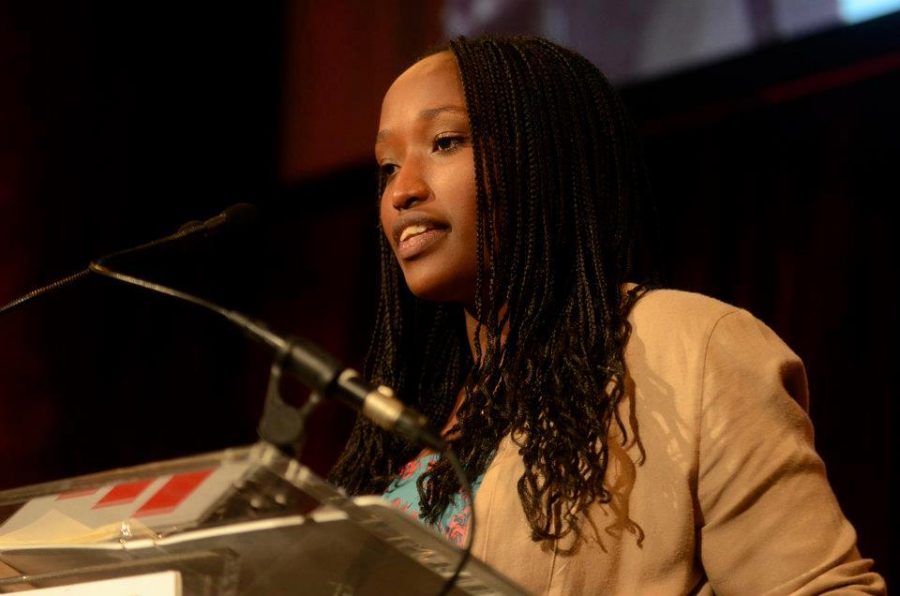Gatumba Massacre Survivor Making Mercy Proud
A tragic event taught a girl to survive since the age of ten.
The clock read 2 a.m. as Sandra woke up with the sweats, trembling in her mother and father’s arms. The nightmare she wished would go away was still lingering in her mind. She tried to close her eyes and forget the unexpected massacre that happened to her and her family.
She would tremble in her parents’ arms for a few hours just trying to forget the number of lifeless bodies that were piled on top of one another. But that was etched into her mind forever.
The nightmare consisted of the deadly sounds of gunshots, as bullets flew left and right continued to instill fear into Sandra.
Except it wasn’t a nightmare. It was reality.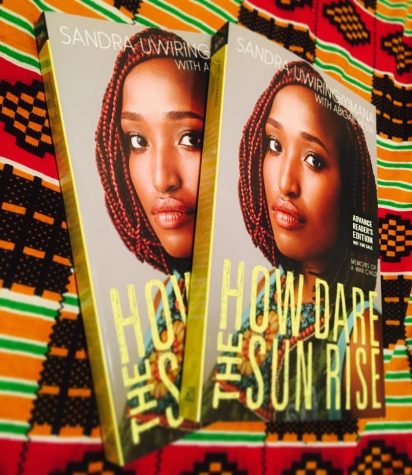
This was the Gatumba Massacre.
On Aug. 13, 2004, assailants murdered 166 refugees and wounded 116 more. Nearly 500 of the survivors of that night have relocated to America.
Twenty-two year old Sandra Uwiringiyimana, studying International Relations, still recalls the horrific event as though it happened yesterday.
Since an early age, she and her family had fled from Congo and went to the Burundi refugee camps. It soon became her routine as she was always on the move.
The same year that they first started fleeing, Sandra’s little sister was born. They needed to move in and out of these camps due to the constant on going wars in the Congo.
“Every now and then, we would be going to the refugee camps because there was always some kind of war,” said Sandra. “Then in two weeks we would go back home.”
As her family were on their way to the Gatumba camp, they were robbed at gunpoint. All the essential possessions they had were taken from them.
“It was a natural thing to be robbed, and we were just unlucky in that moment and got robbed of most of our things.”
As Sandra and her family got to the refugee camp in 2004, she thought it would be another quick two weeks and she would be home. This time was different.
Two weeks turned into four weeks. Four turned into eight, and eventually, her family had been living at the camp for about three months.
Due to her family’s constant moving around to the camps, Sandra barely went to school. And as much fun as it seems not to have to go to school, she was upset that she missed her chance to take the Regents exams to get into high school in Africa.
Her days as a child consisted of fetching water as a chore, and once she finished, she would go play and have fun with her friends, as a child should.
But on Aug. 4 in 2004, it seemed like an ordinary day. She did her chores, she played and had fun with her friends, went back to her tent, had dinner, and went to bed.
Then, later that night, the unexpected happened.
Her refugee camp was maliciously attacked. She was only 10. A force of armed combatants, many of whom were members of the Forces for National Liberation (FNL) had massacred 166 Congolese civilians and had wounded a couple of hundred more at the Gatumba refugee camp, which is on the western side of Burundi, near the border with the Democratic Republic of the Congo.
The FNL is mainly a Hutu rebel movement, which is known for its hostility to Tutsi. The victims were largely Banyamulenge, a group of people often associated with Tutsi.
Sandra’s mother, in a panicked state, woke her daughters and nieces to get them to a safe place. Many at the camp thought she was making this up, but she was not. There was no place safe for anyone.
“At a glance my whole world was turned upside down. I didn’t know what to do.”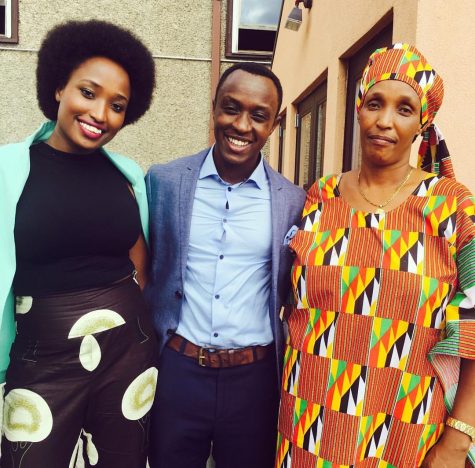
Being a child, Sandra didn’t know what to think; she just tried her best to do what her mother said. She did as she was told and hid with her sister under a mattress.
“I tried to do as much of what my mom was telling me, I didn’t want to disappoint her in that moment,” said Sandra.
As the attackers were shooting everything in their sight, Sandra, her mother and little sister got separated, along with her two cousins and her aunt.
Unfortunately, in the crossfire, her aunt, two cousins, and little sister were shot.
Their lifeless bodies had piled on top of her mother, causing Sandra to believe her mother was dead as well.
“The first thing that came through my mind was, am I an orphan now?”
Sandra went back under the mattress where her mother originally told her to stay hidden, until the next day.
All she remembers was her childhood instinct of wanting to be with her mother.
The next morning, once the storm of bullets had passed, she came out from under the mattress and saw nothing but dust, ashes, bullet casings, and dead bodies of her friends and neighbors.
“As a child, I didn’t know what death was, I thought everyone was going to come back, I didn’t think they were actually all gone.”
A few moments later, a random stranger came up to her and told her that her mother was alive and looking for her. At first she refused to believe him, but after a leap of faith, she trusted him and was reunited with her mother.
“Once I was reunited with my mother, that is when I found out that my little sister, as well as my cousins and aunt were all dead,” Sandra said with a crack in her voice.
As Sandra continues to speak, she takes a few slight breaths and pauses between her words.
“That’s the only way she survived. With the pile of dead bodies of my family on her.”
Many children were left without their parents, and many parents were left without their children.
Before she was reunited with her mother she didn’t know what was going to happen.
“I always thought my parents were invincible. Every child has that kind of mentality.”
After the massacre, the rest of her family had reunited and started the process of relocation. After their reunion, they left Burundi right away, and went to Rwanda. They started the interview process for resettlement April 3, 2007 and were eventually relocated to Rochester, New York.
Since the 9th grade, she has been a pretty vocal activist, as she wants to make sure her voice is heard, and wants the government of her home country to punish the men who caused the massacre.
“The two men responsible have come out publicly and admitted to committing that horrendous crime,” Sandra said sternly. “They are able to walk free with no repercussions.”
That’s why Sandra fights for her voice to be heard and be the voice of reason for her country. She wants people to have an opportunity to have their chance at freedom, as she did.
When she began writing How Dare the Sun Rise, alongside award-winning journalist, Abigail Pesta, who has lived and worked around the world, she had hopes of this being her own form of the Declaration of Independence.
She wanted to write her own story. Sandra wanted to inspire those who have gone through tragedies of their own to persevere and to survive.
“She [Sandra] refused to be defeated by the terrifying and infuriating events of her life. She saw beauty in the world despite it all. She has such a powerful voice–honest, authentic, and true,” said Pesta.
Now, Sandra describes herself as a happy person who just had bad things happen to her.
The details of the book include that of the massacre, as well as her childhood in Congo and her adjustment to American culture.
“Whenever I’m interviewed, people always ask me about the massacre and make it seem so gloomy and sad.”
She feels many fail to realize that her entire life was not misery. “In fact, I was a very happy child growing up.”
There are three parts to her book. Part one is about her childhood, and how she had a very happy one. There are many stories of her and her friends and what they did and how they grew up.
The second explains more in depth the massacre itself. Sandra goes into detail of what she thinks was the cause of this massacre.
“It was basically a hate crime.”
Part three deals with her adjusting to American culture. Some stories are funny, but some a bit more serious.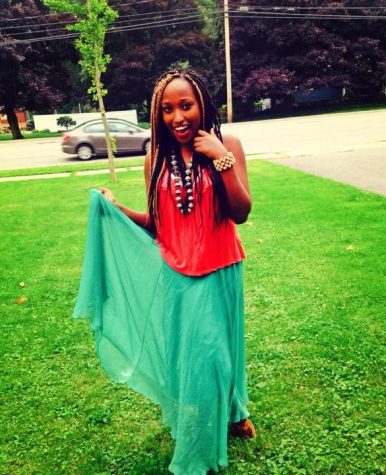
With a chuckle she added, “It’s like a funny but serious coming of age story, but with a few serious topics and moments.”
The book is more than just the gloominess and sadness of the massacre. Sandra talks about strong and important issues, such as mental health in refugees. She herself has had to deal with her own personal struggles of surviving for the last decade.
After the massacre Sandra went through a period of years when she suffered from mental illness as well as struggled with her religion. Growing up her family was very religious. That changed for Sandra in 2004.
“After the massacre I just hated God.”
She went on to say that she couldn’t find it in herself to believe that God was real. She wouldn’t say that she coped, but just survived day by day. She found the joy in the small things in her life.
She would suppress her emotions and get through the years simply not feeling anything.
“It wasn’t just me that shut down; it was everyone who managed to survive this immense tragedy.”
***
The clock read 2 a.m. as Sandra awoke from the daunting nightmare as bullets, gunfire, and lifeless bodies clouded her dreams.
This time, it was just a nightmare, not real life. Her only escape from the massacre was writing her book.
“I want those who buy and read my book to feel inspired by what I have overcome and survived,” Sandra said. “Yes, it was a horrible tragedy, but I learned to survive and want people out there to know they’re not alone.”
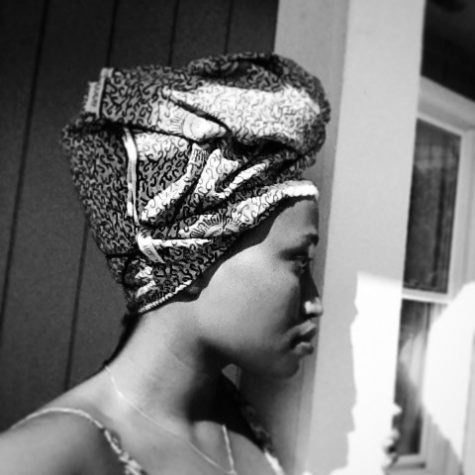 Everyone has their own story to tell, and they all have their own way of surviving.
Everyone has their own story to tell, and they all have their own way of surviving.
Sandra had her own ways. She went through a dark period in her life.
“I didn’t just make it. I survived.”

Weronika is majoring in Media Studies/Radio and Television Production at Mercy College.
Her hobbies are obsessing over television shows, mainly Supernatural...



